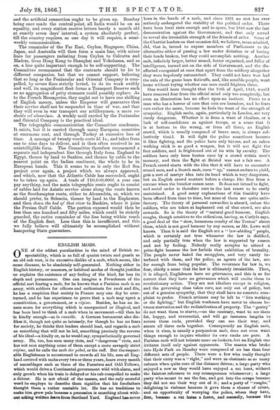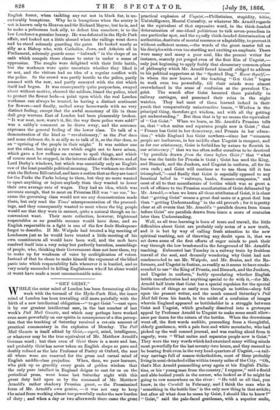ENGLISH MOBS.
ONE of the oddest peculiarities in the mind of British re- spectability, which is as full of quaint twists and gnarls as an old oak root, is its excessive dislike of a mob, which seems, like some diseases, to be absolutely self-generated. Nothing either in English history, or manners, or habitual modes of thought justifies -or explains the existence of any feeling of the kind, far less its -depth and permanence. One can imagine a Frenchman of the -official sort fearing a mob, for he knows that a Parisian mob is an -army, with soldiers for officers and enthusiasts for rank and file, he has a suspicion that society in Francs may one day be over- turned, and he has experience-to prove that a mob may upset a -constitution, a government, or a regime. Besides, he has an in- nate scorn for everything which is unorganized or illogical, and -has been bred to think of a mob when in movement—till then he as kindly enough—as /a canaille. A German bureaucrat also dis- likes it, though not quite so intensely, for though he has no fears for society, he thinks that leaders should lead, and regards a mob -as something that will not be led, something precisely the reverse -of his ideal—a kindly or, as he would say, sympathetically governed army. He, too, has seen many riots, and "dangerous" riots, and has not seen anything come of them except a more savagely strict regime, and he calls the mob der pobel, or the raff. But the respect+ able Englishman is accustomed to crowds all his life, sees all Eng- land covered with mobs every two or three years, hears every month -of assemblages such as those of the Foresters and Odd Fellows, which would drive a Continental government wild with alarm, and only growls when his train is delayed or his cab compelled to make -a detour. He is not afraid of the masses, and the only scornful word he employs to describe them signifies that his forefathers thought them a rather unstable lot. He has no traditions to make him grow pale because a procession is marching about with- • .1)ut asking wsitien,leavelrom Scotland Yard. England lumnever
been in the hands of a mob, and since 1831 no riot has ever seriously endangered the stability of the political order. There have been local riots enough and to spare, but 1848 saw the last demonstration against the Government, and that only served to reveal the irresistible strength of the friends of order. Some of the Chartist leaders on that occasion did, we believe, mean mischief, did, that is, intend to expose members of Parliament to the alternative either of passing a law under dictation or of having their heads broken, but they could accomplish nothing. Another mob, infinitely larger, better armed, better organized, and fuller of intelligence, turned out on the side of Government, and the dis- affected recognized at once that apart from the soldiery altogether they were hopelessly outmatched. They could not have won had the rule of the game been fisticuffs, and, like sensible people, went home without trying whether one man could frighten three.
One would have thought that the 10th of April, 1848, would have removed fear from the official mind only too completely, but even an illustration has no effect upon en instinct. Prove to a man who has a horror of cats that cats are harmless, and he fears cats rather the more, because he feels the want of the strength of sympathy. English mobs, again, particularly in London, are very rarely dangerous. Whether it is from a want of idealism, or a lack of self-confidence as against troops, or a sense that it is at bottom in the wrong, or from all three, an English crowd, which is usually composed of brave men, is always col- lectively timid. It will fight the police sometimes because it likes fighting, and the police have only batons, and an oaken walking stick is as good a weapon, but it will not fight the foot soldiers, and is frightened out of its wits by cavalry. The soldiers have only been beaten once by a crowd within men's memory, and then the right at Bristol was not a fair one. A French crowd starts with the idea that it will have to encounter armed men, and a Scotch mob, once "up," cannot endure to yield, gets a sort of martyr idea into its head which is very dangerous, but an English crowd scatters before a charge like flies from a carcase when the butcher comes near. It does not intend to fight, and social order is therefore sure in the last resort to be easily maintained. A good many explanations of this timidity have been offered from time to time, but none of them are quite satis- factory. The theory of personal cowardice is absurd, unless the soldiers, who are taken at haphazard out of that crowd, are also cowards. So is the theory of "natural good humour, English roughs, though sensitive to the ridiculous, having, as Carlyle says, a good deal of the "slow, humorous cruelty of the Teuton" about them, which is not good humour by any means, as Mr. Lowe well knows. Then it is said the English are a " law-abiding " people, which is certainly not true whenever the law is disliked, and only partially true when the law is supported by reason and not by feeling. Nobody really scruples to attend a prize-fight because the law forbids that exhibition of brutality. The people never hated the smugglers, and very rarely in- terfered with them, and the police, as agents of the law, are farrn enough from being popular. The reverence for law is, we fear, chiefly a sense that the law is ultimately irresistible. Then, it is alleged, Englishmen have no grievances, and this is so far correct that they have no grievances which will excite them to revolutionary action. They are not idealists except in religion, and the governing class takes care, not only out of policy, but out of a genuine sympathy, that they shall have no concrete com- plaint to prefer. French artisans may be left to "live working or die fighting," but English workmen have never to choose be- tween starvation and the redistribution of property. The "gentry" do not want them to starve,—on the contrary, want to see them fat, happy, and reverential, and will go immense lengths to secure those ends, provided they can see their way, and secure all three ends together. Consequently an English mob, when it rises, is usually a purposeless mob, does not even want things enough to inquire whether its own ranks are pure. A Parisian mob will not tolerate mere on-lookers 1 but an English one irritates itself only against opponents. The masses who broke into Hyde Park on Monday were composed of no less than four different sets of people. There were a few who really thought that their entry was a "right," and were as obstinate as so many cabmen when quite sure of the distance driven; a large party who enjoyed a row as they would have enjoyed a rat hunt, without the faintest reference to any consequences whatsoever ; a large party who meant to see the fun, and got into the scrape because they did not see their way out of it ; and s party of "roughs," delighting in violence because it gave them a chance of crime, and an opportunity of worrying the police, whom they hate, first, because a. rat hatta, a ferret, and secondly, because the English ferret, when tainting any rat not in black fur, is un- endurably bumptious. Why he is bumptious when the sentry is not is known only-to Heaven and Sir Richard Mayne, but he is, and to make a policeman look silly, to defeat him somehow, is to the low Londoner a genuine luxury. He was defeated in the Hyde Park affair, and looked not a little absurd when the railings went down and he stood solemnly guarding the gates. He looked nearly as silly as a Bishop who, with Catholics, Jews, and Atheists all in Parliament, solemnly guards some " bulwark " in the shape of an oath which compels those classes to enter in under a sense of oppression. The roughs were delighted with their little battle, but the workmen were quite uncertain whether they liked it or not, and the visitors had no idea of a regular conflict with the police. So the crowd was partly hostile to the police, partly amused with the row, and partly annoyed with the riot which itself had begun. It was consequently quite purposeless, swayed about without motive, cheered the soldiers, hissed the police, tried to protect the flower beds—a point upon which the real London workman can always be trusted, he having a distinct sentiment for flowers—and finally, melted away homewards with no very distinct feeling, except that the awful monotony of life in those dull grey warrens East of London had been pleasurably broken. "It wor neat, now, worn% it, Sir, the way them police were sold?" was a cabby's comment as he drove away, and the sentence expresses the general feeling of the lower class. To talk of a demonstration of the kind as "revolutionary," as the Post does and some clubmen do, is as silly as to talk of it, as the Star does, as an "uprising of the people in their might." It was neither one nor the other, but simply a row which ought not to have arisen, which gave a few ruffians an excuse to spoil things, and which of course must be stopped, in the interest alike of the flowers and of Lord Derby's windows, but which was essentially only an English row of the least possible political meaning. The workmen no doubt wish the Reform Bill carried, and have a notion that as they are taxed for the Parks the Parks belong to them, but they no more wanted to upset anything or injure anybody than they wanted to lower their own average rate of wages. They had an idea, which was accurate enough, that to meet on Primrose Hill was "no use," be- cause the governing class would not see any demonstration made there, but only read the Times' misrepresentation of the proceed- ings, and they consequently wanted to meet where the big people would see that they were in earnest, quite a natural though an in- convenient want. Their mere collection, however, frightened respectables as no possible menace would have done, and an English respectable in a fight is one of the few fools Shakspeare forgot to describe. If Mr. Walpole had treated a big meeting of Londoners just as he would have treated a little meeting of his own constituents all would have been well, and the mob have resolved itself into a very noisy but perfectly harmless, assemblage of people, who, thinking their Government does not hear them, try to make up for weakness of voice by multiplication of voices. Instead of that he chose to make himself the exponent of the blind panic into which respectability falls whenever it is hustled, and so very nearly succeeded in killing Englishmen who if let alone would at worst have made a most unconscionable noise.































 Previous page
Previous page